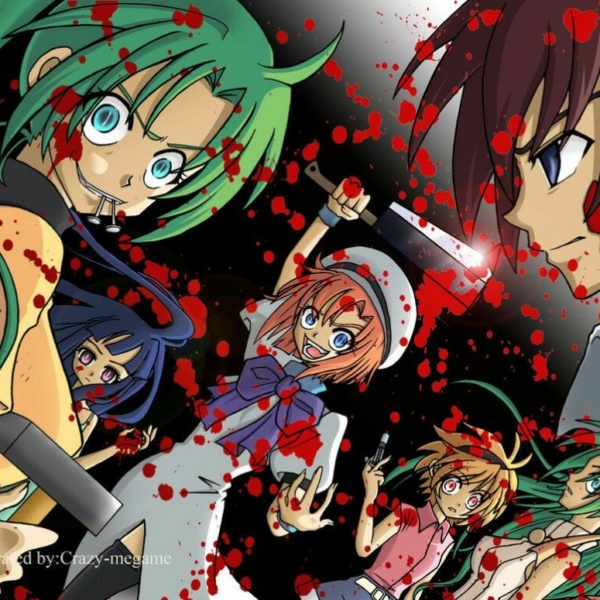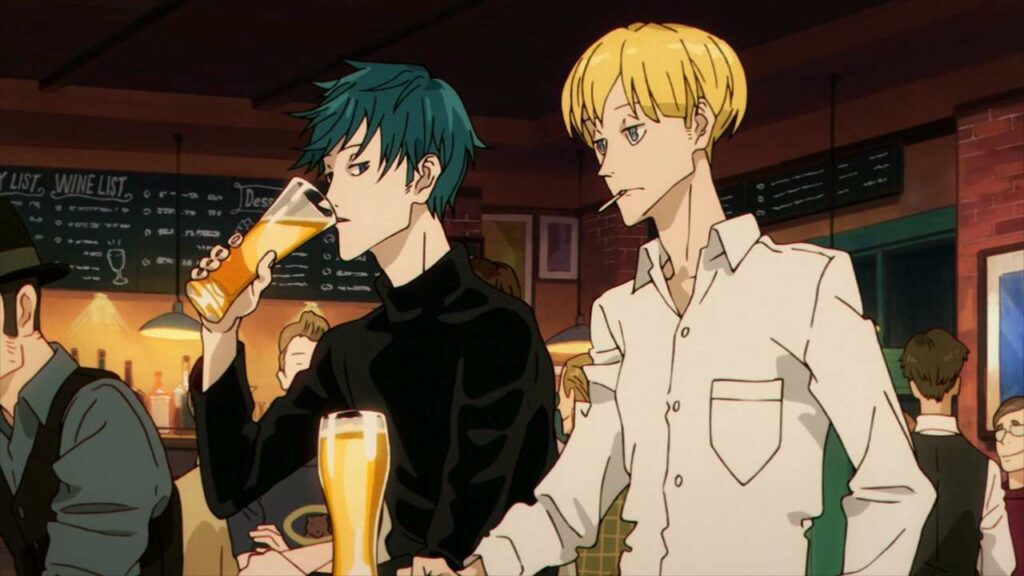
At last! A collab on the best magic fantasy anime you should be watching has resisted the power-creep that has seen more and more shows making the list every season! We’re offering a decent, manageable number this time around, with a selection of Honorable Mentions and a couple under a new category we’re sadly thinking is going to feature more and more often as time goes on. With new providers entering the simulcast/streaming market and regional licensing issues rearing their ugly heads to an increasing degree, oft times reversing the progress Crunchyroll pioneered in proving that a service combining ease of use and value for money will indeed prompt people to legally obtain their anime, we’re sad to start including shows we think you should watch but are only viewable to a minority of the world. These shows are legally available, this collab does not condone piracy, but are so restricted in some fashion that the majority of the fanbase are likely incapable of accessing them. Hopefully you’ll see these best magic fantasy anime shows/sequels pop up somewhere in the future, or stumble across them on disc sometime.
Just to warn you all, next anime season is going to be a monster. Enjoy the nice compact collaboration on the best magic fantasy anime, this is just a breather.
The 4 Best Magic Fantasy Anime Shows You Should Be Watching
ACCA: 13-Territory Inspection Dept. – [ACCA: 13-ku Kansatsu-ka]
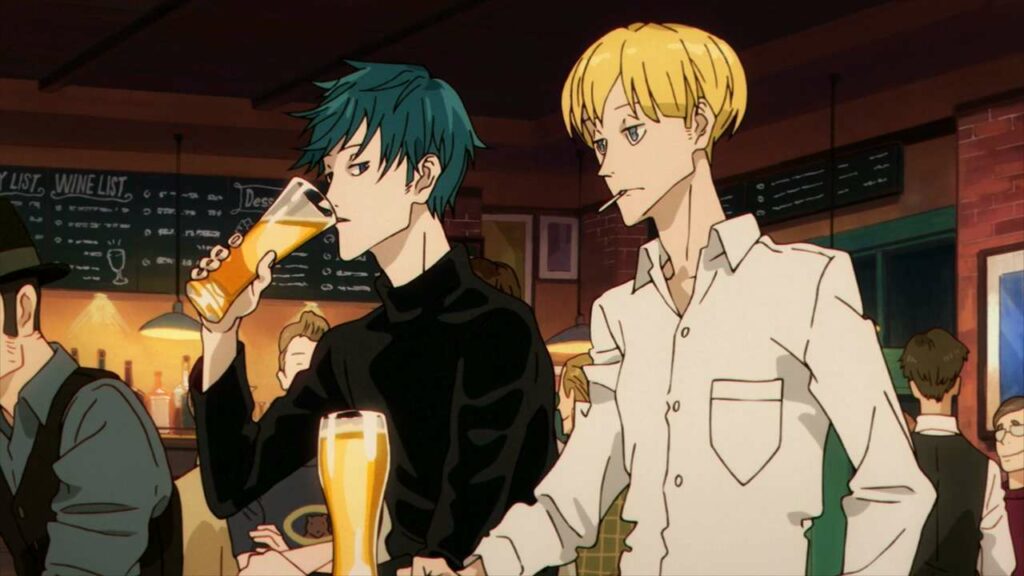
Genre: Political Drama, Slice of Life, Bread
Spoiler-free Synopsis
In the Kingdom of Dowa, there are 13 separate, but equally important autonomous states. The peace of the central government is kept by a giant organization called ACCA, made up of many departments that handle affairs both within and between the states. These… are their stories. Jean Otus, the second in command of the ACCA Inspection Agency, is an absent-minded man tasked with an important job: travel the kingdom and audit each state’s bureaucratic organization. Through his travels, Jean gets swept up in rumors of a coup d’etat, and he may be involved whether he wants to or not.
Why You Should Be Watching
If previews and buzz for ACCA piqued your interest going into the season, it was probably because of its substantial cool factor. Don’t worry, that’s out in spades, from an infectious OP to a main character who joins the pantheon of anime characters that make smoking look really chic. ACCA has more than just style, though. It’s not afraid to go slow and build its intrigue. This is no high-stakes spy thriller, but it knows when to dole out nuggets of brewing conflict that keep you wanting more. The structure of the story also holds its own as an episodic anime. The individuality of the 13 states is a great canvas for telling satisfying, self-contained stories working within the larger plot.
It’s always a plus to have a magic fantasy anime story about working adults, too. Jean and his colleagues are nigh devoid of “anime-y” personalities, but they seem like people you might find at your job. Jean himself is a rare character type. He’s not hot-headed, but he’s not impossibly cool either. He’s spacey and a carb addict, but his discernment and intelligence make him a believable fit for a high-ranking bureaucrat. The setting of ACCA itself also has a lovingly rendered, lifelike feel. Cities, offices, and apartments seem lived-in, and each state Jean visits has regional flair. And the food the characters are always eating – you can almost smell it… don’t watch this on an empty stomach.
ACCA isn’t a thrilling blockbuster of an anime, but it’s more than worth your time. It’s something to savor (like a good piece of Badon district sandwich bread), and before you know it, you may find yourself caught up in its world.
Miss Kobayashi’s Maid Dragon – [Kobayashi-san Chi no MaiDragon]
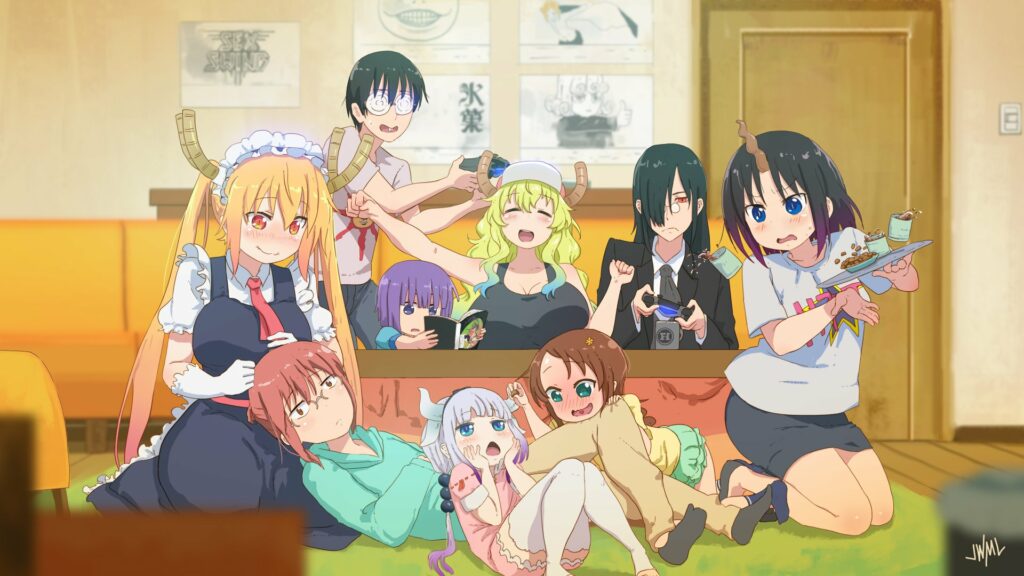
Genre: Slice of Life, Comedy
Spoiler-free Synopsis
When Miss Kobayashi rescues a dragon named Tohru on her way home from work, the mythic creature falls for the office worker and agrees to repay an eternal debt. Taking the form of a human maid, Tohru begins to familiarize herself with the normal ways of the new world. Not long into her services to Kobayashi, however, other dragons begin to show up and take interest in humans. The once ordinary life of a quiet woman becomes a whirlpool of excitement and lighthearted comedy in this slice of life by Kyoto Animation, the studio behind The Melancholy of Haruhi Suzumiya and Nichijou.
Why You Should Be Watching
It is pretty easy to tell this best magic fantasy anime is right in KyoAni’s wheelhouse, with the style borrowing a lot from the off-the-wall mayhem of Nichijou. Where Dragon Maid really makes itself unique, though, is how it can be just crazy enough to remind of that over-the-top comedy but still nail all the checkboxes on what makes for a great slice-of-life series. There is a terrific amount of attention placed on the smooth pacing in pretty much every scene and generally great aesthetics throughout. The voice work is also on-point in both the English dubs and the original Japanese; the latter is especially fun with the four female dragons singing the ending theme together, which is almost dangerously sweet. Fhana’s opening theme is also quite upbeat and catchy (and has been found by some of the Taped Reality community to function as a fantastic alarm clock tune).
The characters all bring their quirkiness out within reason — which, judging by how the original manga took scenes to uncomfortable heights, is a huge credit to the team who wrote the adaptation. It’s interesting to note that even as powerful and out-of-place as the dragons are, the humans in the show stand up to them evenly in terms of strangeness and strong personality quirks. But perhaps one of the most endearing parts of the series (and one that keeps the atmosphere perfect) is in the “growing family” dynamic within Kobayashi’s winged circle. Moving into new apartments, school supply shopping, and even something as subtle as parts where the characters are watching television together build a perception of closeness that leaves the audience incredibly satisfied at the conclusion. It’s both heartwarming and hilarious, and it makes these winter Wednesdays just plain better for being there.
Interviews with Monster Girls – [Demi-chan wa Kataritai]
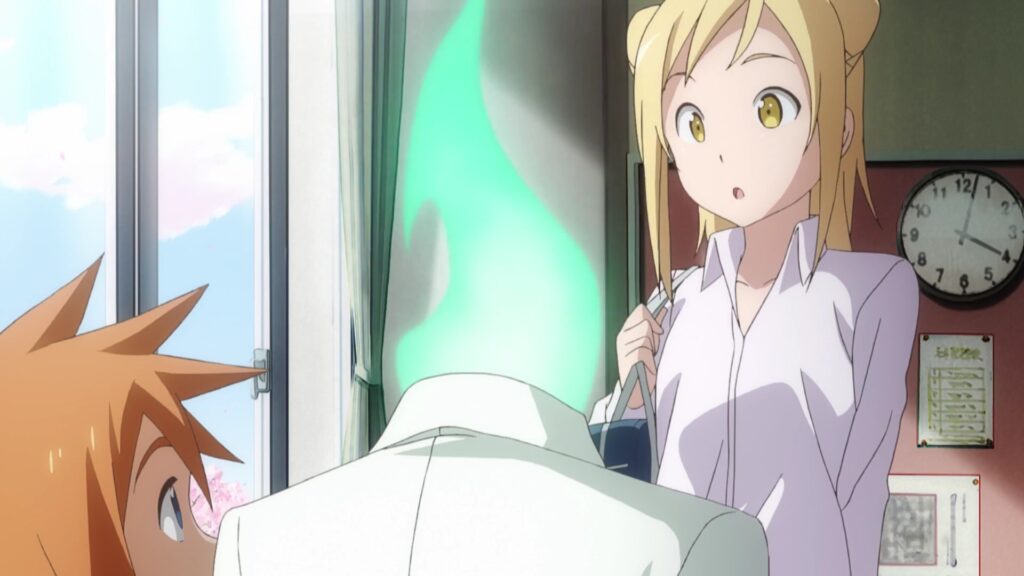
Genre: Slice of Life, Comedy
Spoiler-free Synopsis
Takahashi Tetsuo, a high school biology teacher, has always been fascinated with Ajin, the official term for humans with mutations matching mythological monsters. However, their incredible rarity has thwarted all of his attempts to actually meet any – until his school has a sudden influx of them at the beginning of a new term. His three new students and the new math teacher are all Ajin – and prefer to be called a more modern and cute term, Demi. Takahashi-sensei now spends his lunch breaks and after school time cheerfully interviewing these monstergirls, learning what’s fact and what’s fiction while trying to help them solve their everyday high school problems.
Why You Should Be Watching
Interviews with Monster Girls is an adorable show with a stellar cast of loveable characters. For being a massive bear of a man by Japanese standards, Takahashi is a gentle giant who gets along quite well with both the staff and his students. Each of the girls has a completely different outlook on both high school life in general and being a Demi, but they end up being a happy group of friends, and it really makes you want to cheer for them. Satou-sensei, the math teacher fresh out of college, is not only an effective female role model and sympathizer for the girls, but is also nursing a crush in such a way that she comes off as a cute young girl in her own right, which effectively makes her the fourth member of their group of close friends.
If Monster Musume: Everyday Life with Monstergirls was a harem romcom using monsters as metaphors about obvious physical abnormalities and overcoming them, Interviews with Monster Girls is somehow a more mature (despite featuring a younger-on-average cast) dramedy about anxiety, making friends, and fitting in when you’re just a bit outside the norm. It has two points that really sell it over the competition. The first is that there’s far less romance, certainly nothing worthy of being called a harem; the two teachers are mutually attracted but don’t let it get in the way of work, and he’s not even considering the students as romantic targets in any way. Which brings up the second main point: Interviews with Monster Girls feature the incredibly rare-in-anime phenomenon of adults actually acting like responsible adults. It’s kind of amazing that even though the premise itself is so tropey, there’s amazingly little cliches in the actual plot, and almost no fanservice, which keeps what you’d expect to be a cringe factor surprisingly minimal. But above all that, it’s a fun, upbeat and cute show, with both laughs and d’aww every week. It’s one of the most consistent high notes in the season.
Tanya the Evil – [Youjo Senki]
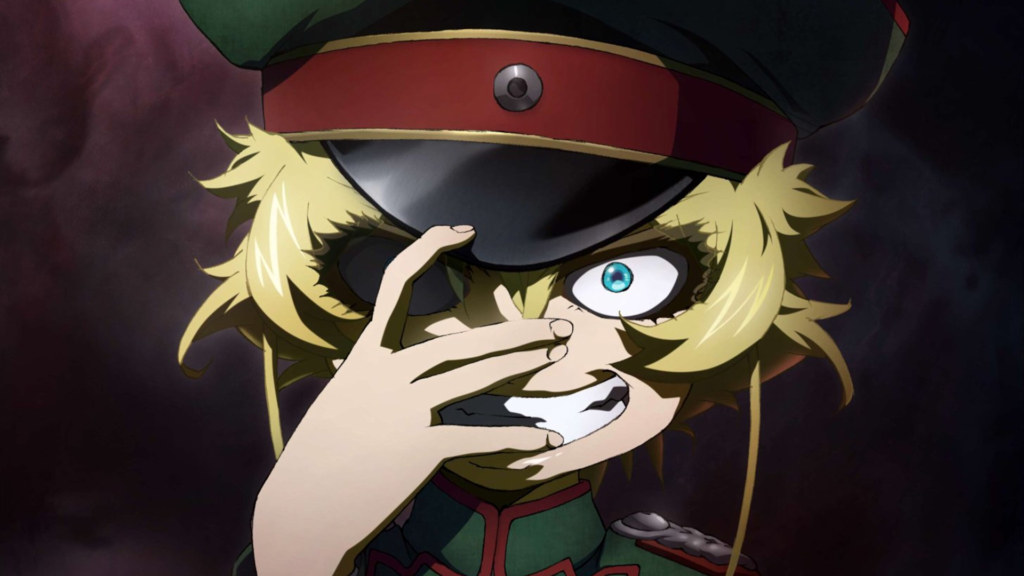
Genre: Atheism, Action, Military
Spoiler-free Synopsis
This isn’t the best example of a magic fantasy anime, but bear with us. In an alternate version of the year 1924, war rages on, but the most deadly soldier around is neither a grizzled old veteran, nor a wise and patient general. Rather, she is a very young girl by the name of Tanya Gurtcheff, whose mind for tactics and affinity for magic are both second to none. While most of Tanya’s military colleagues either applaud her endless victories, or fear her merciless attitude, not a soul is aware of her true nature. Despite appearances, Tanya is no mere little girl, but a ruthlessly efficient Japanese salaryman, reincarnated into this parallel world after angering a being which called itself “God”, as a wager to see if hardship and turmoil would kindle religious devotion. Eager to prove “God” wrong, Tanya is prepared to use every trick in her arsenal and claw her way to the top of this new reality, in order to once again live a comfy and peaceful existence.
Why You Should Be Watching
Chronicling the timeless struggle of an asshole versus God, there’s little doubt that Tanya thrives on embracing the ridiculousness of its premise. In a world otherwise almost entirely populated by stoic anime military men, the presence of a sole little girl is equal parts captivating and tongue-in-cheek, made even better by the fact that she is more callous and manipulative than any of her superiors combined. One of the keys to the show’s success is in the careful balance with which it hands Tanya victories and setbacks, allowing something for everyone to enjoy. If you’re rooting for Tanya and her cold machinations, you can savor every little scheme that comes to fruition, every carefully-laid plan and subtle trick that Tanya exploits to pull herself forward, in the same vein as classic anime anti-heroes like Death Note’s Light. On the other hand, if you’re rooting against her, you can relish in her repeated setbacks and seemingly impossible tasks, trying to somehow fight and defeat an entity that apparently holds the entire universe in the palm of its hand. I do worry that the series will be unable to reconcile these two aspects of itself when it comes time for a conclusion, but that’s almost putting the cart before the horse, since it’s so rare for modern anime adaptations to have a proper ending at all. Regardless, at the moment Saga of Tanya the Evil offers more than enough twisted fun to keep audiences entertained, bolstered by surprising production values and visual sense for a fledgling no-name studio.
The 3 Best Magic Fantasy Anime Sequels You Should Be Watching
KonoSuba – God’s blessing on this wonderful world! 2

Genre: DEEEEEEN, Comedy, Slice of Life
Spoiler-free Synopsis
Konosuba tells the story of Kazuma, a shut-in otaku NEET. Following his sudden death and rebirth into a new fantasy world, Kazuma thought that his new life would be that of an amazing video game hero. However, this fantasy world quickly proved that not to be the case. Kazuma is paired up with useless allies, has mediocre stats, and every time he does something good it seems to just cause more problems for him. After living in this world for a while, he thought that he might grow used to things, but this too is clearly not the case. To make matters worse, after narrowly defending the town from a roving Ancient Weapon/Natural Disaster, Kazuma inadvertently teleported the exploding core of the machine to an aristocrat’s mansion. Now he is suspected of treason. Will his fantasy life ever stop trying to screw him over?
Why You Should Be Watching
Konosuba was one of the surprising smash hits of Winter 2016. Featuring a cast full of misfits, the series played off Kazuma’s interactions with his party members Aqua, Darkness, and Megumin to great comedic effect. Each member on the surface would appear to be a capable ally, but in reality they all have ridiculous flaws that make them useless. Aqua is an amazing Arch Priest with pathetic intelligence, Megumin is an amazing Wizard that will only cast one extremely EXPLOSION type spell that renders her helpless, and Darkness is a Crusader who can’t hit anything and enjoys getting beaten far too much for her own good. Kazuma’s imagined fantasy world turns out to not be even remotely close to what he thought, and the constant lampshading of fantasy world tropes through this reversal of expectations was a common theme of the series’ events.
Konosuba’s second season continues what made its predecessor great in the comedic field and capitalizes on the events of the first season, which culminated in Kazuma being arrested for treason. Much like everything else in this good-for-nothing fantasy world, the trial is unfair, Kazuma’s allies are useless, and the results are not what he expected. More characters are introduced, including Kazuma’s prosecutor and Megumin’s long time rival, and thus more mayhem ensues. The animation still leaves something to be desired, but if you were hoping for a continuation of the series that would maintain the same comedic tradition as its predecessor, you will not be disappointed.
Descending Stories: Shouwa Genroku Rakugo Shinjuu – [Sukeroku Futatabi-hen]
![Descending Stories: Shouwa Genroku Rakugo Shinjuu - [Sukeroku Futatabi-hen]](https://www.tapedreality.com/wp-content/uploads/2022/02/Descending-Stories-Shouwa-Genroku-Rakugo-Shinjuu-Sukeroku-Futatabi-hen-1024x538.jpg)
Genre: Drama, Historical
Spoiler-free Synopsis
Following the conclusion of rakugo practitioner Yakumo Yurakutei VIII’s dramatic story of his past growing up under the names Bon and Kikuhiko and his tumultuous friendship with fellow rakugo trainee Sukeroku Yurakutei II and relationship with the geisha Miyokichi, the story shifts to Yakumo’s student Yotaro as he takes on the title of Sukeroku Yurakutei III. Despite becoming well beloved in the rakugo community, Yotaro still struggles with escaping the specter of his checkered past and finding his own style of rakugo, all while trying to juggle his personal life and helping the field of rakugo evolve with the times, instead of dying out.
Why You Should Be Watching
The first season of Descending Stories: Showa Genroku Rakugo Shinju was one of the best series from 2016, and was among many people’s pick for the overall Anime of the Year, myself included. The second season maintains the same high level of quality that made the show so beloved by nearly all who saw it. The writing, scene direction, and characters remain top notch. The shift from the story of Kikuhiko/Yakumo to Yotaro is one that was initially a cause for concern for some people, but I am glad to say it was a change worth making, as week in and week out Yotaro continues to grow further as not only a character but as a person with each new curveball that life throws his way. This is especially evident in his interactions with Konatsu. This is of course not even including Konatsu’s own story, which is just as fascinating if not more so than Yotaro’s, as she struggles to find her place in the world of a performance art she loves with all her heart that is, unfortunately, a traditionally male-only place. Much like the first season, this season is all about the characters growing through adversity and learning from life’s often harsh lessons. If you loved the first season of Descending Stories: Showa Genroku Rakugo Shinju, then I am happy to say this show’s second act is just as phenomenal.
Blue Exorcist: Kyoto Saga – [Ao no Exorcist: Kyoto Fujouou-hen]
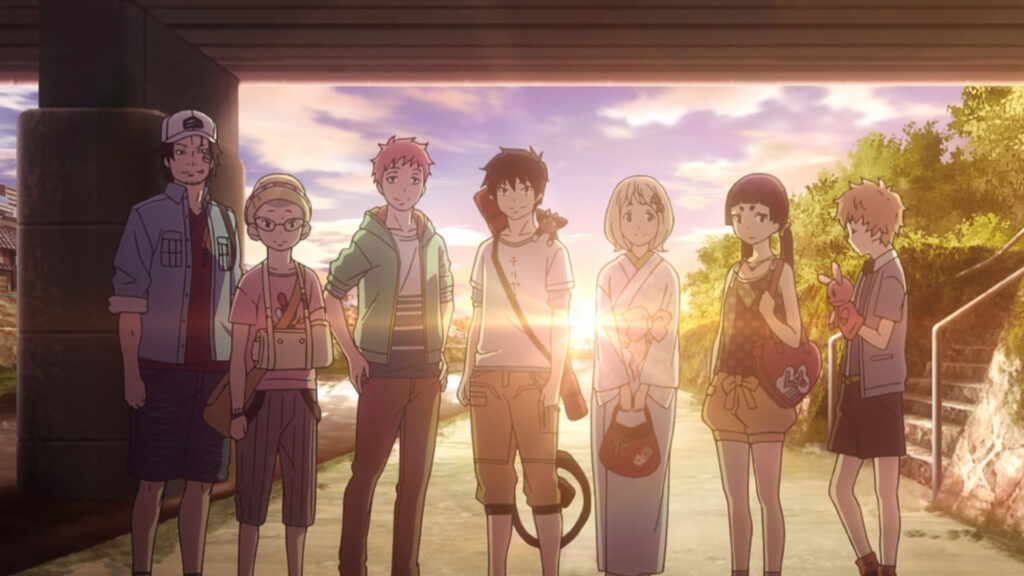
Genre: Action, Demons, Fantasy, Supernatural
Spoiler-free Synopsis
Rin Okumura’s true identity as the son of Satan has been exposed to both his fellow classmates and the True Cross Order. Having narrowly avoided execution, he is released on the condition that his blue flames don’t run rampant again. Failure to do so will result in his imminent execution. In order to better himself, Rin works on repairing his fractured relationships with the Exwires while undergoing training to control his power. However, the Left Eye of the Impure King’s theft and a subsequent attempt to steal its sister relic, the Right Eye, poses unprecedented trouble for Kyoto and all of Japan. The Order then dispatches a team of exorcists (including Shura, Yukio, Rin, and his Exwire classmates) to Kyoto for an investigation in response to the recent incidents.
Why You Should Be Watching
Let’s start off by addressing that fat elephant in the room about this best magic fantasy anime — namely, the first season’s ending. In summary: Trash it. Episodes 18 through 25 are anime-original content. And since the Kyoto Saga begins after episode 17, you can completely disregard them. Moving on.
Blue Exorcist: Kyoto Saga takes its foot off the gas pedal to build on its characters, world, and past events instead of getting right down to demon exorcism business. This is a stark contrast from the first season, where the narrative and character development maintained balance with the action. That’s not to say Kyoto Saga is devoid of action, however. While fights are far and few in-between, they are Kyoto Saga’s reward for patience and appreciation in all the small actions it takes for the sake of a compelling, occasionally emotional narrative. Every one of these actions — be it character development or a flashback — leads to higher stakes in the main conflict for all characters involved. Kyoto Saga is a slow burn, but it’s a spark that will end in a dazzling display of fireworks.
The 1 Magic Fantasy Anime Show From Amazon Strike You Should Be Watching But Probably Can’t:
Scum’s Wish – [Kuzu no Honkai]
![Scum’s Wish - [Kuzu no Honkai]](https://www.tapedreality.com/wp-content/uploads/2022/02/Scums-Wish-Kuzu-no-Honkai.jpeg)
Genre: Psychological Drama, Romance, NTR
Spoiler-free Synopsis
Hanabi Yasuraoka and Mugi Awaya are a highschool couple and they are in love. With other people. To add to their heartache, their respective objects of affection, teachers whom they have each known since childhood, are apparently falling in love with each other. In turn, Hanabi and Mugi have their own admirers. This love polygon becomes the foundation for a perceptive dissection of love, loneliness, and the muddled nature of human interaction.
Why You Should Be Watching
There are many romance anime series set in high school, but there are few that capture the mentalities of their teenage subjects: both the hormonal irrationality and the clarity with which they can view the cusp of adulthood. Especially through its central character, Hanabi, Scum’s Wish juxtaposes that sense of being out of place in the world, the growing perception of the complexities of relationships, and the melodrama that comes with teenagers being in love. It is an empathetic portrayal of those lost in love, but also services the cynical outsider who observes its chaos.
For sex, love, and happiness are not remotely unified in Scum’s Wish. It embraces sexual acts as part of the regular human experience and is a refreshing tonic to the number of series that equate physical consummation with the pinnacle of couple contentment. The depiction of nudity and sex is not exploitative, but rather continues to develop the characters, especially highlighting the separation that sometimes exists between sexual acts and emotion.
The realism of Scum’s Wish also stems from the illustration of foibles, vices, and blindspots people have when they idolize the imperfect. Both Narumi and Akane, the unrequited love interests, are actually shallow and manipulative, respectively. There is no moralizing or punishment; instead it simply shows these humans how they are and how they act, including their seemingly unjust successes. It brings nuance to this atypical romantic study.
With the richness of the material, Chika Anzai is doing some of her finest voice-acting work as Hanabi. Her earnest performance, amongst many stellar ones, is akin to that of Takuya Eguchi as Hachiman Hikigaya from My Teenage Romantic Comedy SNAFU, in that it is not simply effective pathos, but rather a persuasion of the audience to reinhabit their teenage selves. Additionally, Director Andou Masaomi has further honed his skill at visually showing emotional entanglement and estrangement since White Album 2. His direction is enhanced by delicate animation that makes the experience more tangible, as well as by the audio—right from the opening theme, the music and score underline the ever-undulating feelings of the lovelorn. Simply put, all the elements of Scum’s Wish coalesce to form one of the best romance anime in existence.
The 1 Magic Fantasy Anime Special From Crunchyroll You Should Be Watching But Probably Can’t:
The Dragon Dentist
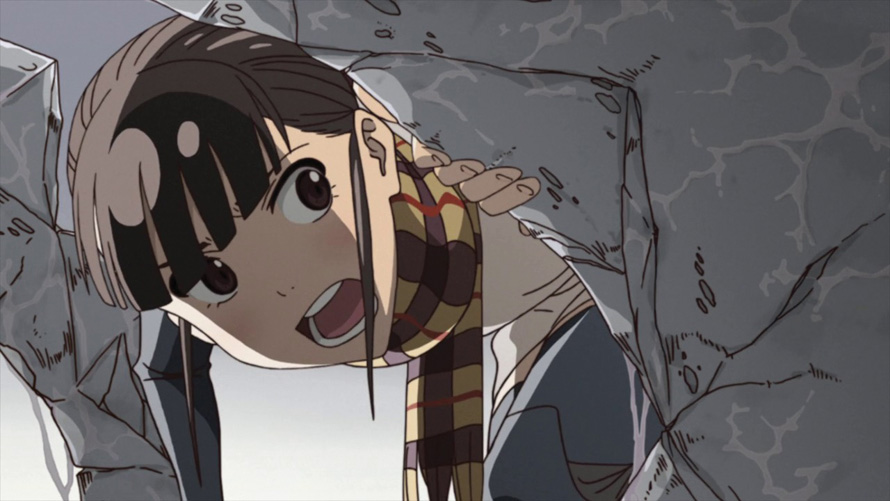
Genre: Periodontal Action, Psychological Fantasy
Spoiler-free Synopsis
In the midst of a seemingly eternal war between land inhabitants and the skybound dragon dwellers, Bell—a former soldier and casualty of the conflict—finds himself aboard a dragon, now reanimated through its mystical powers after being vacuumed in as detritus. Swiftly inducted as a Dragon Dentist, protector of the dragon’s power sources (and oral hygiene, as the name suggests), Bell finds that his unusual return is only the herald of encroaching terrors. This is a magic fantasy anime that everyone should watch.
Why You Should Be Watching
As might be expected given their past collaborations, most notably FLCL and the seminal Neon Genesis Evangelion, director Kazuya Tsurumaki and sound director Hideaki Anno elevate the unique premise of the original short film from well-conceived worldbuilding to a visually-conveyed psychological dissection of its characters, akin to recent series like Garo: The Animation or Noragami. Much like in those series, and indeed FLCL and Evangelion, the parasitic “mushi”—inspired by a combination of periodontal disease and insect-related meaning of the term—come to symbolize features of the neglected psyches of the characters (also cleverly stemming from the possible translations of mushi, such as “ignore”). By expanding the predetermination concept that was only touched on in the short, the fairly nihilistic nature of a dragon dentist’s life naturally flows into discussion of human purpose and place in existence, which is the thematic crux of the series.
However, The Dragon Dentist is immediately enthralling because of the strikingly cinematic composition of the frames and interesting use of color palettes, which inform the underlying cerebral elements, but are also simply beautiful to watch (particularly the establishing shots of the dragon passing through the clouds). The dragon and mushi designs are imaginative and the CGI rendering blends in fantastically with the traditional animation. The juxtaposition heightens their otherworldliness and especially adds to the dread of imminent mushi attacks. This is aided by sound direction that is an aural treat and adds to the ethereal qualities of the world. The mark of Anno’s caliber, however, is the occasional absence of sound altogether. The total and overbearing silence accentuates the starkness of the dragon dentists’ reality more than anything else. In sum, The Dragon Dentist is an intriguing adventure fantasy that guises a fairly contemplative anime, and is an excellent hour and a half of escapism.
Honorable Mentions For The Best Magic Fantasy Anime
Akiba’s Trip: The Animation
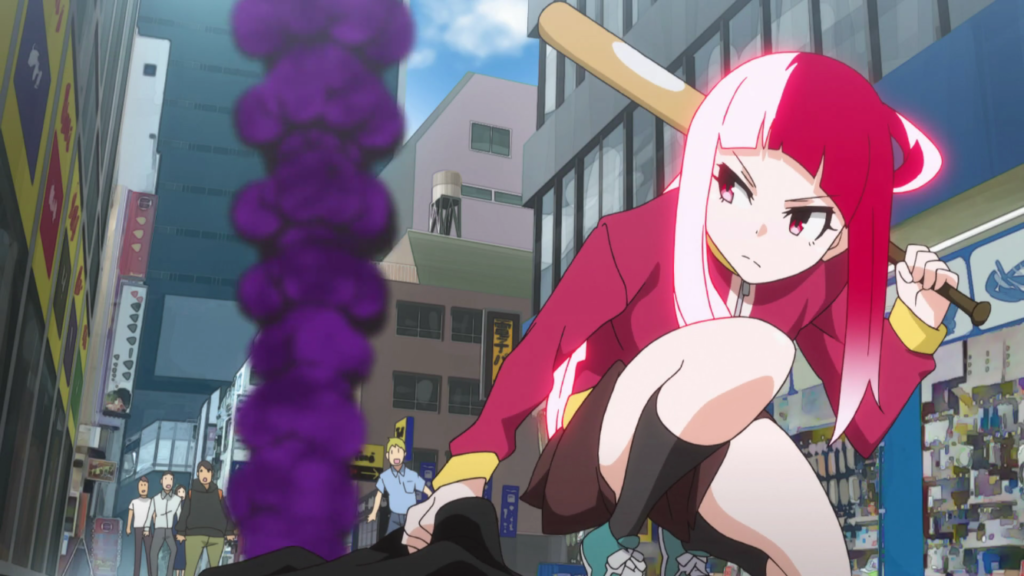
Genre: Shameless Weebism, Comedy, Action, Ecchi
Spoiler-free Synopsis
This is the best comedic magic fantasy anime we could find. Akihabara is a home and mecca for otaku of all stripes, and so is loved by uber-otaku Tamotsu, who journeys there with adorable sister Niwaka. But on this fateful day, they are caught up in an attack by the Bugged Ones, ridiculous monsters that possess people and seem to enjoy cosplay and who are running amok in Akihabara. Rescued from these beings by the powerful and mysterious girl Matome Mayonaka, Tamotsu ends up getting himself mortally wounded trying to help and Matome (who turns out to be a higher level Bugged One who opposes the more troublesome of her kind) resurrects him. Now imbued with the power to fight but unable to leave the boundaries of the city, Tamotsu and Matome along with the inexplicably strong and energetic cosplaying powerhouse Arisa, they form the team Electric Mayonnaise to protect Akihabara from the Bugged Ones, who are defeated…how? Well, by stripping them of their clothes and exposing their skin to sunlight! Obviously. Oh, Akiba’s Trip… Akiba strip! I get it! It’s a PUN!
Why You Should Be Watching
Akiba’s Trip shouldn’t work. An adaptation of a video game whose premise is battling evil by stripping enemies of their clothes? It just sounds like a dumb, ecchi mess. But it’s not!
The premise is ridiculous but the show rolls with it by using that conflict against the Bugged Ones as the backdrop for what the show really wants to do, and that’s shine a spotlight into the various corners of otaku-dom and celebrate them with gentle mocking. Each episode features battles against Bugged Ones and generally involves some clothes getting stripped, but the meat of the stories, and the best jokes, come from the examination of the various interests and subcultures available in Akihabara. There’s an episode for figure collectors and an episode for audiophile nerds – the type who spend thousands on speakers – and an episode on idols and idol fans (which is the best episode so far and features a hilarious sequence with a super popular idol who deadpans and sings in monotone. Trust me, it’s funny in context), to build-your-own-PC types, etc. It mines these various geeky obsessions for comedy, and hits more than it misses. This is all enhanced by a fun cast of characters, whose personalities play off each other well to keep the jokes coming. The standout is the perpetually happy and ludicrously strong Arisa, who has some real fun reaction shots throughout the series.
Is it a show about stripping clothes off enemies to defeat them? Yeah, but it’s really more a celebration of how ridiculously fun it is to be a member of those subcultures, whether you prefer “otaku” or “geek” or “nerd”.
All forms of entertainment and art are subjective, none more so than comedy. Whether a show like Akiba’s Strip works for you mostly boils down to whether or not you think its particular brand of humor is actually funny or not. It probably won’t work for everyone, but if you give it a chance and don’t just dismiss it as dumb ecchi ridiculousness, I think you’ll find Akiba’s Trip is a hell of a good time.
Why You Shouldn’t Be Watching This Best Magic Fantasy Anime
Self-awareness can only get you so far in justifying a premise that so transparently exists to disrobe cute anime girls, regardless of how cunningly and linguistically witty your apostrophe placement seems (though fairly, there are a few men in briefs left flustered). That is indeed the type of joke this series thrives on: there are well-worn pratfalls or the young sister undercutting the protagonist to inform somebody that there is no way the protagonist could have a girlfriend owing to the fact that is a loner. There is also a particularly clever visual and aural gag of focussing in on a girl’s large bosom and then a cow moos in the background. No wonder they used it twice in 57 seconds (you’re welcome to also check). But if that’s your jam, then you’ll be happy to know that nearly every type of girl and stock personality is there for your amusement (including brown characters, so woo for diversity)!
In the interest of being less glib, Akiba’s Trip: The Animation is adapted from a game series that, based on the gameplay watched before writing this piece, is a JRPG where you smash up vampire-adjacent enemies called Synthesizers until their clothes are removed so that the sunlight drains their exposed bodies of power. There are two halves to anime: the first is affectionate comedic parody, while the second is a more serious action plot derived from the aforementioned gameplay.
The show clearly enjoys being able to so wholly steep itself in riffing on otaku fandom and obsession thanks to its location, but the writing is content to avoid jokes with real set-ups and punchlines, instead preferring to describe fictional toys and situations in a rapid-fire, over-the-top manner. The other type of joke employed—the reaction shot to a mildly cutting comment that has been used a thousand times before in other anime—becomes stale almost immediately. Not even the very enthusiastic voice-acting can elevate the jokes beyond their very basic components.
The action side of things is more successful, and the fights are surprisingly well-choreographed and animated (though some of these women could stand to use a sports bra), which makes it a pity they did not commit to it more wholeheartedly. The action is unabashedly brutal towards its characters, giving them swelling injuries and bloody stab wounds. Akiba’s Strip could have easily become the lower stakes Kill La Kill that its artstyle is aping if it had avoided the jarring tonal dissonance.
As it stands, however, Akiba’s Trip: The Animation is a tonal mess where insistence on lame gags and jokes make the combat-heavy—and far more interesting—plot feel like an afterthought. Worse still, this unnecessary addition to the game’s premise actually negates the impact of the “serious” story, and makes it feel like just another show in the glut of not particularly interesting fanservice-laden anime.
Gabriel DropOut

Genre: Slice of Life, Comedy
Spoiler-free Synopsis
Gabriel Tenma is the perfect role model for the other Angels in Heaven. She is perfect in every way: Cute, Smart, Kind, Proactive and very Sociable. As part of an Angel´s education, they have to spend some time living on Earth with the humans they will protect. However, on Earth Gabriel ended up discovering the world of the MMO games and her life would take a turn … for the worse. She has become a recluse, with garbage piling up and sheer laziness ruling the day. This is the story of Gabriel and her everyday High School life by dealing with humans, other angels and even other demons while she only wants to be left alone and play more games!
Why You Should Be Watching
The story in Gabriel DropOut is nothing to write home about since it was just an excuse for the characters to be together in a High School Setting. Still, the motto of “Things aren’t how it looks like” can be very well applied for the characters since we have a Lazy Angel who prefers to keep gaming (Gabriel); an “Angelic” demon who is very kind hearted (Vigne) ; a sadistic Angel (Raphiel) and a total airhead (Satania). These characters and the way their different personalities class alongside the situations they are is what the heart and soul of this series is. By seeing how both Vigne takes Gabriel out of her comfort zone and at the same time Gabriel with her responses does the same to Vigne; or Raphi tries and (more often than not) succeeds in cheating Satania whose pride and attitude makes her for an easy target are in truth an exemplary formula for laughs! Still, while some people might find the comedy quite repetitive, since “it repeats the same joke over and over”, the different way this joke is told and the different consequences and reactions that every character gets makes that even if it’s a similar situation, something new will appear, and chances are that at the very least a smile will be drawn!
Why You Shouldn’t Be Watching This Best Magic Fantasy Anime
Anime comedies often get stuck in a rut because of Manzai. You know it, even if you haven’t seen the term before. A funny man deadpans something, AND THEN THE STRAIGHT MAN YELLS THE PUNCHLINE. It’s the go-to for most anime comedies and it works … sometimes, but seeing it as often as we do gets tiring. What’s especially problematic with Gabriel is that the joke/punchline is the same exact thing every time. The angels are actually terrible people, the demons are actually good. Again and again and again. You can tell the joke differently, and have different consequences but the joke stops being funny after the fifth time of being told. So we have a tired form of comedy in which the straight man constantly has to make the same punchline over and over and over and over. Granted, the fifth episode finally introduces a new character in which the show can finally try on new punchlines but by then it may be too late. Gabriel is amusing for an episode sure, but it also drives its one joke into the ground, buries it, and holds a funeral service before it does anything new or different.
Fuuka
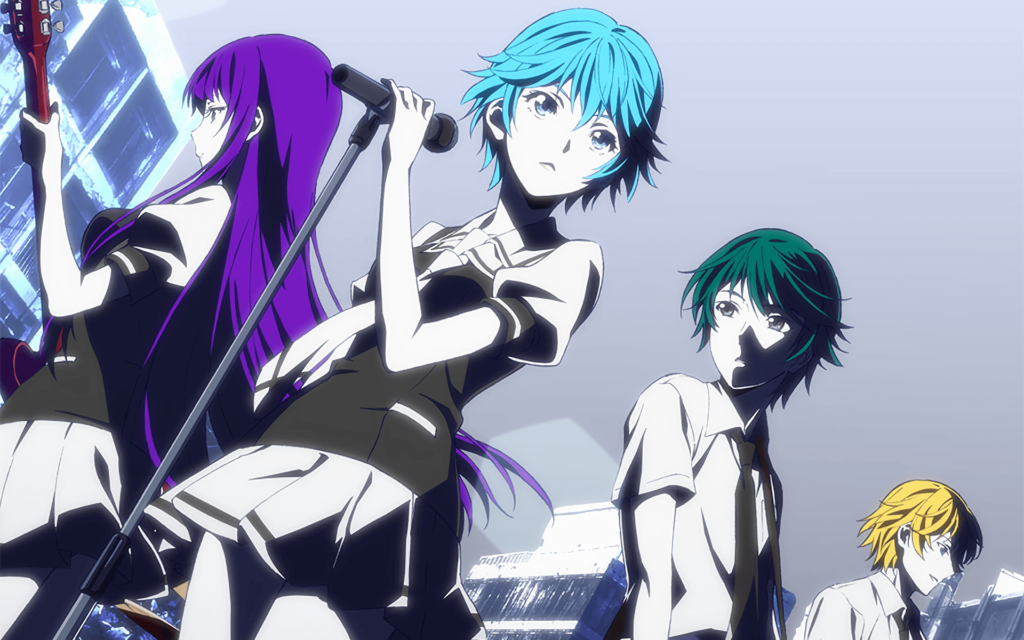
Genre: Seo Kouji Bullshit, “Drama”
Spoiler-free Synopsis
Yuu Haruna might be new to the expanse that is Tokyo, but he is content to remain a social recluse and instead live vicariously through the internet. That is until the vivacious Fuuka Akitsuki knocks him down and smashes his phone. Though their meeting is inauspicious, Yuu is drawn to Fuuka and her love of music, which he finds is an untapped passion for him as well.
Why You Should Be Watching
Detractors of Seo Kouji’s previous manga and their adaptations might take umbrage at Fuuka’s inclusion on this list. After all, his predilection for somewhat forced melodrama and fanservice is on display at full throttle in Fuuka. However, the premise of forming a band with strong personalities, and the creation of emotion-infused music, naturally lends itself to Kouji’s ability to write moving dramatic moments. Furthermore, unlike with his other works, Fuuka has strong thematic throughlines that bind it: moving outside one’s comfort zone, bringing conflicting people together to achieve a common goal and learning to pick oneself up again and moving on in the face of setbacks or crushing blows. Though not exceptionally original, they keep the narrative moving along and with a tighter focus than say the adaptation of A Town Where You Live, another Seo Kouji manga, which in its single cour was already getting out of control.
A Town Where You Live is an interesting counterpoint to Fuuka, as the latter series has unexpectedly protracted the adaptation, the ramifications of which on the overall emotional arc will be interesting to see. Yet this added time has fleshed out the key relationship between Yuu Haruna and Fuuka Akitsuki, which is the central tenet of the series; delving further into their burgeoning relationship can only pay dividends on the emotional investment the audience has in them. Needless to say, for a music-themed series, the addition of a score and actual songs heightens the impact of the Fuuka. Both manga readers and newcomers will find something to enjoy in the non-stop ride that is Fuuka.
We hope that our collaborative review of the best magic fantasy anime we could find was informative, and that you’ll watch some of the anime we recommended. It’s not easy finding the best magic fantasy anime, but we tried our best to do so.

